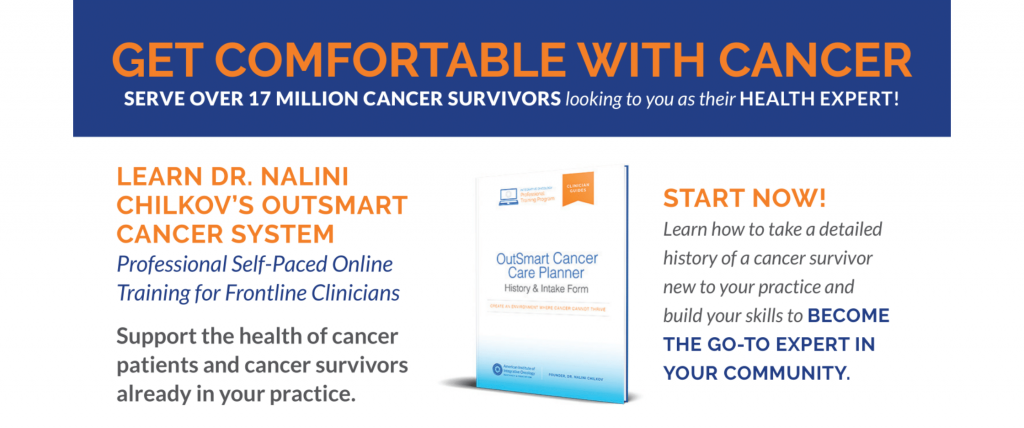You may not treat cancer in your practice, but you do have patients who are at risk due to personal and family history, patients who may be undergoing or recovering from treatments, patients who are survivors worried about recurrence and patients living with cancer as a chronic illness. And you may also have patients who are family members concerned about their loved ones.
There is no HEALTH MODEL in conventional oncology care, yet health and wellbeing, peace of mind and sense of agency are in the center of the hearts and minds of cancer patients, cancer survivors and their families.
There will be 19 million cancer survivors in the US alone by 2024. Who is supporting their health? Who is trained to help them recover and keep them well?? …not the oncologist.
How can you help these patients?
A breast cancer survivor who successfully completed her treatments 8 years ago comes into your office as a new patient complaining of persistent peripheral neuropathy and ongoing cognitive changes since her treatment. How can you resolve these long-term adverse effects?
An ovarian cancer patient currently undergoing aggressive treatment every 21 days comes into your office complaining of severe diarrhea, neuropathy and sleep disruption. What can you do to help her get through her treatments with less adverse effects, maintain her weight and nutritional status?
A colorectal cancer survivor who completed his treatment 3 months ago is continuing to have 10-15 bowel movements daily and is profoundly fatigued. What will you do to restore normal bowel function?
A prostate cancer patient on endocrine blockade therapy is suffering from hot flashes. Should you also be concerned about loss of bone mass and sleep cycle disruption?
An endometrial cancer survivor is suffering from dermatitis and colitis, adverse effects of her dramatically successful immunotherapy treatment and now has chronic autoimmune inflammation. How will you manage this?
A head and neck cancer patient who has trouble swallowing is losing weight and muscle mass.
How can you provide a plan for repair from oral mucositis, restoration of the oral mircrobiome and repletion of calories and nutrients?
These patients are searching for clinicians that can guide and support them through every phase of their cancer journey. Just as in helping your patients navigate other chronic illnesses, patients look to you for a plan, for monitoring and guidance so that they can maintain and regain their health during and after their treatments.
When a patient has a collaborative team providing integrative care everyone wins, the patients, families and care providers. Patients who have a clear plan and support have the opportunity for better outcomes, better prognosis, greater peace of mind, a sense of control and agency and an improved quality of life.
Let the oncologist be the cancer expert. You can be the health expert on their team.
Standard of care in oncology must change such that care includes not only a team of disease experts (usually medical oncologist, surgeon, radiologist) but ALSO a team of health experts.
Towards this end I founded the American Institute of Integrative Oncology Research and Education and have created an online self-paced training program for front line clinicians who want to expand their skills and their practice and fill the huge need in our communities and serve these patients. If you did not specialize in oncology, you probably had one course on this topic but you need to fill the gap in your training to feel confident in doing so.
The Foundations of Integrative Oncology Training is not for clinicians who want to practice oncology. It is front-line clinicians who want to feel confident, knowledgeable and well trained in supporting the health side of the cancer equation. This self- paced online training is for clinicians who want to increase their impact, expand and grow their practice and represents 35 years of clinical practice and experience.
The first step is learning how to take a comprehensive and complete history of patients whose lives have been touched by cancer.
You can receive a complimentary copy of the
OUTSMART CANCER CARE PLANNER History and Intake Form
and learn more about the Foundations of Integrative Oncology training here


